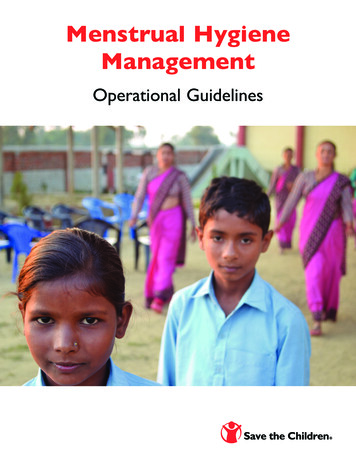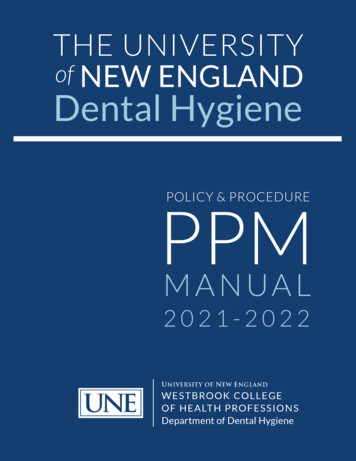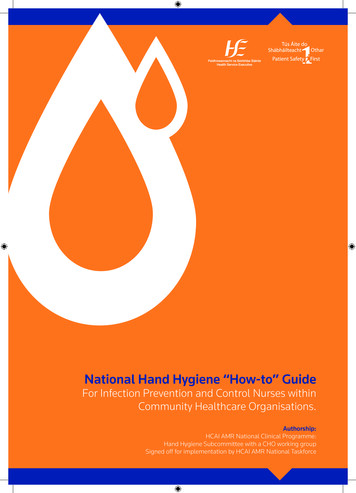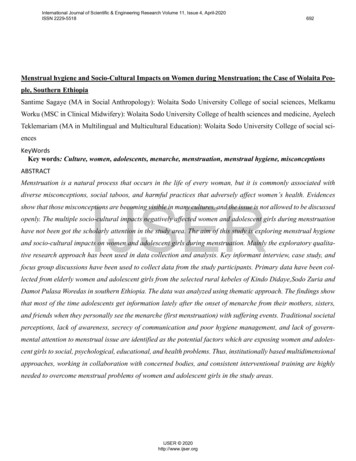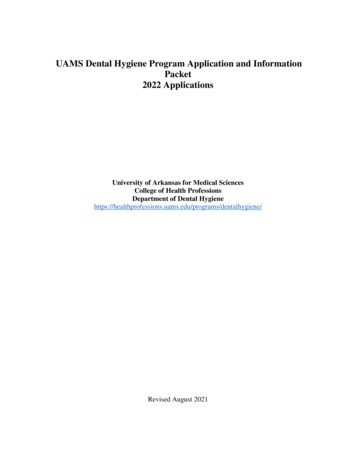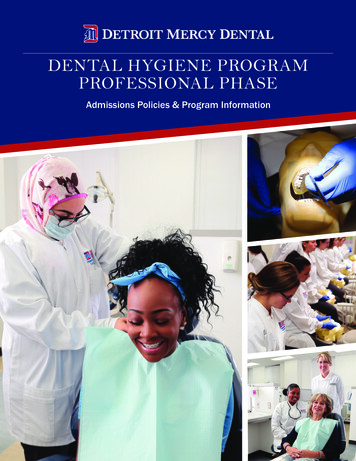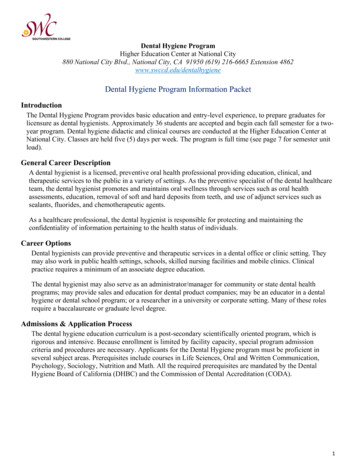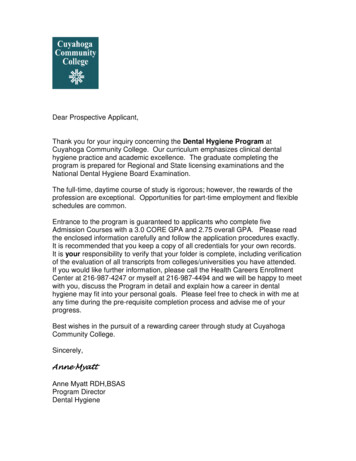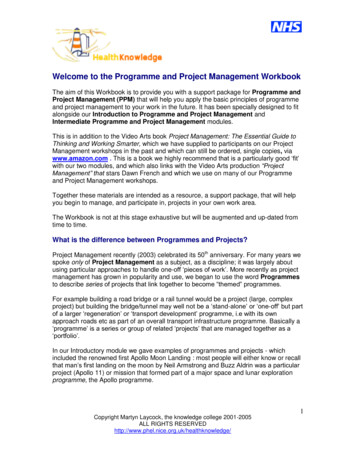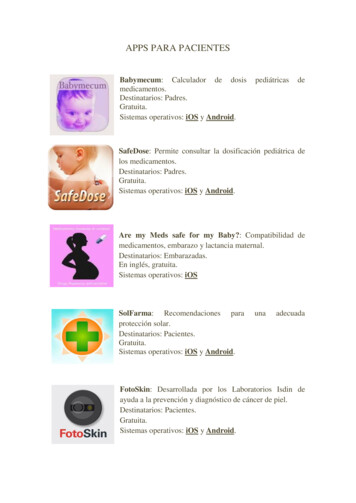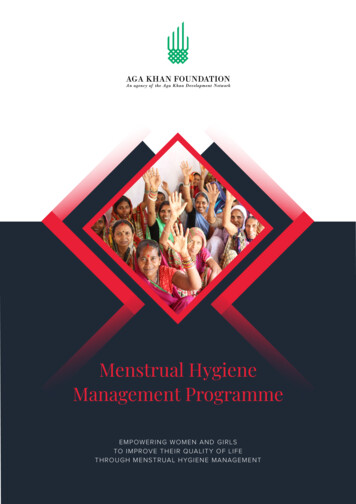
Transcription
Menstrual HygieneManagement ProgrammeEMPOWER I NG WO M EN AND GI R LSTO IMPR OV E TH EI R Q UALI TY O F LI F ET HROUGH MEN STR UAL H YGIENE M ANAGEMENT
BREAKING THE TABOOA BackgroundObjectivesIn several parts of India, menstruation is ataboo subject; this ever-pervasive stigma is aproduct of the cultural myths and long-standingtraditions in these regions. Many believe thata period is a sign of impurity or an omen ofbad luck, which has led to a monthly pattern ofsecrecy and shame amongst women and girls.Women and girls are faced with restrictions athome and may not be allowed to partake invarious activities at school, leading to increasedisolation and low self esteem. The high levelof stigmatization has produced an immensegap in knowledge about menstruation and theassociated hygienic practices, which in turn hasled to an ongoing cycle of increased healthrisks, absence from school and work, and lossof dignity.317Villages2In 2015, in response to the Government ofIndia’s Swachh Bharat Abhiyan (“Clean IndiaMission”), The Aga Khan Development Network(AKDN) launched the Comprehensive SanitationInitiative. The Initiative is a five-year programmeaimed at facilitating access to improvedsanitation and hygiene for over 700,000 peoplein six states in India. Its implementation is acollaboration of several AKDN agencies: theAga Khan Foundation (AKF), the Aga Khan RuralSupport Programme (AKRSP), the Aga KhanAgency for Habitat (AKAH) and the Aga KhanHealth Services (AKHS). A key component ofthis initiative is strengthening knowledge andpractice of Menstrual Hygiene Management(MHM) for women and girls in these states.14,827Adolescent GirlsEquip girls and women withthe self confidence and selfefficacy needed to addressharmful socio cultural norms,manage their menstruationhygienically, and bringimprovements in existingcultural norms and practices. Engage communities in making informedchoices regarding menstrual absorbents,and facilitate access to these products Encourage community support to create anenabling environment around MHM and toaddress harmful socio-cultural norms Empower women and girls to discussmenstruation freely and to practice safeMHM without cultural or restrictive socialand cultural practices Collaborate with governments and otherstakeholders for better service and productdelivery10,173Women3
BREAKING THE TABOO WITHKey StakeholdersPractical SolutionsAddressing social/cultural practices andbeliefsAdolescentgirls andmothersThose among whomchange is intendedObjective: Understandwhy menstruationhappens; and recognizethe importance ofmaintaining hygiene. Theaim is to enable themto talk freely withoutembarrassment and tohave the confidence andagency to prioritize theirhealth and well-being.4Teachers,Frontlineworkers, SHGmembers,and menThose who influencethe primaryparticipants to adoptchangeObjective: Are positivelydisposed to discussMHM at home andin institutions andenable the creationof a supportive socialenvironment. The aimis to ensure that theylead the change andhelp women and girls toaddress the social andsystemic barriers.GovernmentLineDepartmentThose who createa conduciveenvironment forchangeObjective: The aim isto create a conduciveenvironment and sharedvision to prioritize MHMplanning and budgeting.By facilitating linkageswith government linedepartments, alsoensure access toentitlements throughvarious governmentschemes on health andnutrition.Prioritizing MHM Secure SchoolsCreating an enabling environment andempowering women and girls with agency andconfidence to negotiate social barriers.Creating MHM secure schools with access toemergency supply of products, trained nodalteachers, and access to soap and water inschoolsEnhancing product accessReaching in-school adolescent girlsFostering partnerships with local manufacturers,establishing linkages with SHG groups, andWCD to ensure product availabilityReaching out to in-school adolescent girlsthrough the Meena Manch Platform to fosterlearning, and leadership skillsPrioritizing Adolescent Health and NutritionContext specific social and behavior changetoolsEngaging closely with Health Department, andthrough the platform of Village Health NutritionDays, and Adolescent Friendly Health ClinicsDevelopment of innovative participatoryengagement tools, and field facilitators tool-kitto enable information disseminationAddressing Waste ManagementPromoting reusables to minimize wastegeneration, while also ensuring a menu ofoptions. Addressing waste challenges incommunitiesEngaging men in the conversation onMenstruationThrough door to door sensitization, engagewith one on one discussions with men to seektheir support towards women’s healthEnsuring last mile reach on MHMCapacitating front line health care workers tostreamline MHM messaging in communities.Alternate financing for MHMEnable SHG groups, and women’s federationsto use inter-loaning for product access andestablish connect with local manufacturers.5
Creating an enablingsupportive environmentThe programme focuses on creatinga supportive social environment in thecommunities it works. This is done througha community-led integrated approach ofmenstrual hygiene promotion where ageappropriate messaging is imparted throughthe platform of women’s self-help groupsand adolescent girls’ groups. These groupsprovide an environment of peer support, wherebeneficiaries can comfortably receive MHMtraining. Awareness sessions conducted inthese groups provide an environment in whichdiscussions can take place freely and problemscan be addressed regularly with a trainedfacilitator. Topics discussed in these groupscover all aspects of the MHM value chain,including education on the natural process ofmenstruation, how to manage menstruationhygienically, the importance of tracking one’scycle, myths and taboos, types of hygienicabsorbents, and proper disposal of menstrualwaste.6As a part of the series of innovative approachesAKDN has implemented to disseminate MHMinformation to a wide range of audiences andage groups, they have created an interactiveMenstrual Hygiene Management toolkit toprovide facilitators with hands-on trainingmaterials and engaging tools to communicatewith women and girls. The kit contains aflipbook that facilitators use as part of a 15session course intended to spread awarenessand facilitate discussions around the corethemes of MHM in a sensitive and comfortablemanner. The toolkit also contains interactivegames, posters and menstrual product samplesto deliver information through an engaging andhands-on method.25,000 Women and Adolescent GirlsCapacity building ofGovernment frontlinehealth workers to deliverMHM messagingLed by a request from the Government,Frontline health workers such as the Anganwadiand Asha workers undergo capacity buildingtraining on facilitating group discussions withwomen and girls. The frontline workforce cadreare trained on effective and sensitive facilitationskills, technical knowledge on MenstrualHygiene Management. AKDN’s MHM toolkitswere developed in response to the need tofurther strengthen facilitators’ knowledge andcapacity to effectively disseminate MHM-relatedmessaging.1,854 Front line workers empowered todeliver MHM messaging in communities.Creating MHM secureschools to reach out toIn-School adolescent girlsIn schools, AKDN is regularizing MHMhygiene promotion, and empowering studentcommittees and adolescent girls’ groupsto drive these changes forward amongsttheir peers. In addition to strengthening theplatform of adolescent girl groups, AKDN isalso sensitizing teachers to be able to deliverroutine awareness sessions for young girls inthese schools. AKDN is also working to developMHM secure schools by ensuring access toemergency supply of products in schools,trained nodal teachers, empowered adolescentgirl groups and access to soap and water.Over 4,586 Teachrs supported toprioritize MHM sessions in schoolsEmpowered to strengthen knowledgeand practice on MHM7
Facilitating informed product choiceand providing a menu of options towomen and girlsAKDN agencies have conducted assessmentsin various geographies to understand localpreferences and other factors affectingmenstrual product choice includingcultural, socioeconomic and environmentalconsiderations. A few pilot initiatives are inprogress to determine which products are mostbeneficial for a particular area and how accessto these products can be facilitated. A seriesof interviews held in Wankaner, Gujarat andSamastipur, Bihar showed a clear preferencein both locations for reusable cloth pads as themain menstrual management product. The vastmajority of the girls surveyed did not know whatmenstruation was prior to their menarche, andthose who were informed about it usually weretaught by their mothers.Due to the wide variety of factors affectinghygienic management, women and girls areeducated on a range of menstrual productsavailable and how to use them. Consciousof economic constraints when purchasingmenstrual products and the environmentalimpact of non-compostable, disposable sanitarynapkins, facilitators are trained to providesufficient information on affordable products,safe and hygienic disposal methods, and theenvironmental benefits of using reusable orcompostable sanitary products.AKDN agencies have formed partnerships with organisations such as Ecofemme, Wonder Wings, Unipads, and others and are today cumulativelyensuring access to reusable products for over 6500 women and girls.Convergence with existing governmentinitiatives to facilitate access to productsand foster linkages with adolescent healthand nutritionAs part of the MHM initiative, project teamsare also in close liaison with governmentdepartments such as the ICDS department,Department of School Education and Literacyand with the functionaries of the healthdepartment to facilitate access to productsat the Anganwadi and schools. Women andgirls supported by AKF in Madhya Pradesh,are today demanding for product access inpublic hearings, leading to the revival of ‘UditaCorners’ in Angandwadi centers in MadhyaPradesh.In Gujarat and Bihar, AKF is also forging closelinkages with Health Department, and areworking to revive adolescent health friendlyclinics to facilitate access for young girls togain access to Iron supplementation and otherhealth and nutrition related services.AKDN efforts have ensured revival ofMHM absorbents at Udita Cornersin select Anganwadi Centres inMadhya Pradesh. AKF has alsobeen successful in streamliningavailability in select AnganwadiCentres in Mangrol and WankanerBlocks of Gujarat.In Gujarat, and Bihar, AKF is alsoworking with the Health Departmentto revive Arogya Swasthya Clinics foradolescent girls.AKF supported Women’s federations in Gujarat are also leading thecharge on MHM in their neighboring villages.89
Community ledvolunteerism modelemerging to sustain gainsmade through MHMEngaging men and boysin the conversationto address social andsystemic barriersA model of community volunteerism is nowemerging in programme geographies ofGujarat and Madhya Pradesh, wherein youngeradolescent girls, and empowered SHG womenmembers (known as Sachet Didi in MP, andSwachata Sakhi in Gujarat) are taking forwardMHM work on their own and neighboringvillages, having realized the importance ofthese sessions and the difference it has madein their lives.Men can contribute towards changing culturalnorms and challenging the taboos aroundmenstruation, and are involved in decisionsrelating to women’s menstrual hygiene needs.Mindful of this, as part of the MHM initiative,AKDN teams are also conducting door to doorsensitization, and are proactively engaging inone on one discussions with men to seek theirsupport towards women’s health.35 Sachet Didis in Madhya Pradeshand 40 Swacchata Sakhi’s are active inGujarat, leading the workon MHM on their own in their villages ascommunity change agents.Using alternate financing to strengthenproduct accessMindful of several challenges with accessing products at village level, AKF has also supportedseveral entrepreneurial led models, training SHG women to be involved manufacturing of menstrualabsorbents, using locally available resources. Several of these groups have pooled together theirresources and are today directly purchasing absorbents from local manufacturers, and re-selling themin their communities at affordable prices.7 Self help group federations across Gujarat and Madhya Pradesh are driving MHM workon the ground, and ensuring product access in their communities, having fostered keypartnerships with local vendors.Efforts have resulted in greaterprioritization of monthly expensestowards’ women’s health, a lesseningof restrictions placed at home duringthis time, and greater support towardsyoung women for continuing their schooleducation.Today men, either as school headmasters,Panchayat leaders, or as husbandsand fathers are creating a supportiveenvironment for women and girls topractice their menstruation with dignity,privacy and safety.1011
Key ResultsGirls and womenhave acquired newknowledge on MHM, andare able to articulate the sciencebehind menstruation as well asestablish key linkageswith health, hygieneand nutrition.Girls exhibit anincreased sense ofconfidence to prioritizetheir health and well-being and areable to articulate their concernsand seek medical help,if required.Creation of a supportiveenvironment, steadfastengagement with parents,especially mothers, improvementin WASH facilities in schools, andaccess to emergency productsupply in schools, have ensured areduction in absenteeism of girls inschools during menstruation.Engagement withmen has ensured asupportive social environment,including prioritization ofhousehold expenses forwomen’s menstrualhygiene needs.12An improvementin personal hygiene,including hygienic use ofabsorbents, handwashing andintake of adequate nutrition iswitnessed acrossall locations.13
The Aga Khan Foundation brings together human, financial and technicalresources to some of the poorest and most marginalised communities withan emphasis on women and girls, investing in human potential, expandingopportunity and improving quality of life.
BREAKING THE TABOO In several parts of India, menstruation is a taboo subject; this ever-pervasive stigma is a . isolation and low self esteem. The high level of stigmatization has produced an immense . cover all aspects of the MHM value chain, including education on the na
